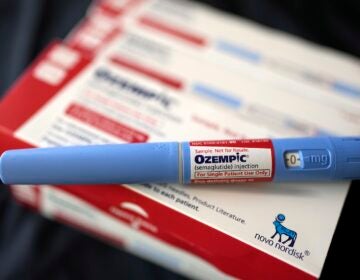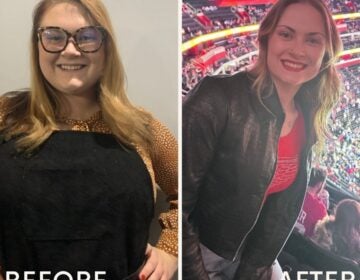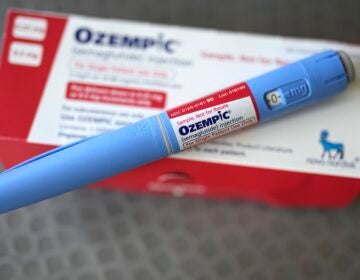New Jersey is considering banning sales of diet and muscle building pills to minors
This comes after a similar law went into effect in New York — the first in the country.
Listen 2:02
New Jersey is considering a bill that would ban stores from selling weight loss supplements to people under age 18. (Kimberly Paynter/WHYY)
From Philly and the Pa. suburbs to South Jersey and Delaware, what would you like WHYY News to cover? Let us know!
New Jersey is considering a ban on sales of diet pills to minors under age 18, with support from health researchers and patients who have suffered from eating disorders.
The proposed bill would ban the sale of weight loss or muscle building pills and supplements to people under age 18, unless accompanied by a parent or guardian. The ban would be enforced by fining the seller up to $750, and would cover online sales as well. The bill passed the New Jersey General Assembly in October, and has been referred to a Senate committee.
Similar laws went into effect in New York and Colorado earlier this year. The supplement industry is pushing back against such legislation, arguing that most of their products are safe and that there is no evidence linking supplements to eating disorders.
Dietary supplements are not sufficiently regulated in the United States, which lead to cases where they contain drugs not listed on the label, said Bryn Austin, a public health researcher at Harvard University. She has advocated for the legislation in New York and New Jersey.
“There is no federal prescreening of dietary supplements before they go to the market for safety or effectiveness,” she said. “What this means is that American consumers are basically the lab rats of this industry.”
Austin also directs the Strategic Training Initiative for the Prevention of Eating Disorders, based out of Harvard University’s T.H. Chan School of Public Health and Boston Children’s Hospital.
In 2019, she co-authored a study that looked at years of federal data. Her study found that diet pills, compared to vitamins, are almost three times more risky for children, sending children to the hospital, and in some cases, leading to disabilities. In another study published in 2020, she found that young women who use diet pills or laxatives to control their weight are several times more likely to be diagnosed with an eating disorder, compared to women who did not use such pills.
“We can put an end to that, just like we’ve done with other harmful products like tobacco, alcohol, pseudoephedrine,” she said. “We don’t sell these products to children. So why sell them diet pills?”
Austin began her advocacy in New Jersey several years ago when Alexandra Xu, who was then in high school, contacted her. Xu, who is now a junior at Rice University studying psychology, suffered from an eating disorder for several years. Xu said she developed an eating disorder after she changed her diet to heal more quickly from a forearm injury due to playing too much piano, and that became an obsession with “clean eating” — a hyper focus on healthy foods.
“I kept finding … something that was so called ‘unhealthy’ about almost every food,” she said. “I would tell my friends at the time that the reason why I had such … strict dietary rules is I had allergies or sensitivity to gluten and dairy … that was kind of the way my eating disorder concealed itself.”

Her doctor diagnosed her with anorexia, and referred her to a therapist and dietician. She later became an advocate for Project HEAL, a nonprofit focused on preventing and helping people recover from eating disorders.
Xu worked with Austin and other advocates on the legislation in New York, including Robyn Shumer, who wrote a memoir about her experience with eating disorders growing up in New Jersey. Shumer said she started taking diet pills and laxatives for more than two decades, starting at age 14, sometimes as many as 10 a day.
“All through high school, I worked … so as soon as I got my own money, I bought diet pills and laxatives,” Shumer recalled. “If there had been … a barrier, if I would have had to show ID, like you have to do … for tobacco or alcohol, I wouldn’t be buying them.”

The supplement industry is pushing back against the bills restricting sales to minors in state legislatures and in court. The Council for Responsible Nutrition, a trade association representing supplement manufacturers, went to court in New York to fight the law.
President and CEO Steven Mister disputes the accounts from Austin, Shumer and Xu, saying that there is no evidence that dietary supplements lead to eating disorders. He argues that people who suffer from eating disorders may also exercise too much, eat too little, or become preoccupied with the way they look.
“This is a very complicated mental health situation that takes a lot more to address,” he said. “But we’re an easy scapegoat to point to these products and say, ‘Well, if we just restrict access to them, our problem of eating disorders will go away.’ That’s misdirection on the part of the proponents of this legislation.”
He stressed that the Food and Drug Administration does regulate dietary supplements because if a product on the market turns out to have illegal drugs in them, the FDA can recall those products.
He said the industry is worth billions of dollars, and that their commissioned survey shows the majority of Americans take supplements. He said because of the law in New York, some retailers have already stopped selling weight loss and muscle building supplements.
“We are taking a product that is safe, is beneficial to consumers, that consumers want to be able to use. And we’re restricting access to it for something that doesn’t exist.”
There are legislative efforts in some other states as well. Lawmakers in Massachusetts are considering a bill like the ones in New Jersey and New York. In 2022, California governor Gavin Newsom vetoed a similar bill, saying it would have required the health department to look at every diet and weight loss product.

Get daily updates from WHYY News!
WHYY is your source for fact-based, in-depth journalism and information. As a nonprofit organization, we rely on financial support from readers like you. Please give today.






